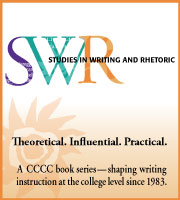Imagine this:
You assign a mixed/multimedia writing assignment for the students in your course. One of the students decides that she will create a comic strip with an accompanying reflection that meets the assignment’s requirements. When she turns in the comic, she’s developed two characters, a brown and white wolf, and a blue dog. These characters interact with each other over various everyday topics. Both are her original creations as is the comic strip itself. Over the semester, the student continues developing these characters and the comic strip, and on her own time, outside your course, she acquires webspace where she starts publishing the weekly comic. After the semester, she continues to stay with this project and develops a readership of about 1000 hits per week.
You might ask yourself if this scenario could really happen, and while I cannot provide data on exactly how often this type of thing happens, this particular instance is from a real-life event. This particular student (not my student but someone else’s) is going to be a college senior next year, and is exploring the possibilities of continuing to work on the comic strip in graduate school. The student’s experienced success with something that began as a relatively insignificant course project – but could grow to be much more – the basis for a career and scholarly study. The research I conducted back in 2007 in a different setting (See “Copyright Law,” http://techcomm.stc.org/journals/february-2010-issue-57-number-1/) – clearly pointed out that due to the affordances of digital, networked writing, the “class assignment” can indeed travel through space and time in amazing ways – in other words, webwriting can have a sort of permanence that perhaps the paper essay did/does not.
But what the comic strip scenario offers, I think, is a really good rationale for why a student, teacher, or writer might actually want to copyright his/her own creations. I know that among writing teachers we do focus a great deal on fair use and the sharing of materials, but along with that conversation it’s always good to remember that we can also take steps to make sure our own creations aren’t exploited in preventable ways. A famous case that some might recall, is the one around the issue of the creation of the Taco Bell Chihuahua. In this particular case, litigation involving sums towards $50 million dollars were at stake over the issue of who created and was compensated for the idea of the dog. Wikipedia outlines some of the issues and provides citations to articles on this particular litigation (See http://en.wikipedia.org/wiki/Taco_Bell_chihuahua — the use of the dog by Taco Bell eventually ended). This is just one (of many) examples. More recently, litigation has ensued on allegations around appropriation by J.K. Rowling of other author’s materials (See “Harry Potter’s US Publisher Faces Breach of Copyright Charges” http://southern-courier.whereilive.com.au/lifestyle/story/harry-potters-us-publisher-faces-breach-of-copyright-charges/). In other words, while we don’t know how likely it might be for a student or teacher to have their creative expressions appropriated in a way that’s possibly exploitive, it’s always good to be aware that if a writer continues moving forward with a comic or cartoon that seems to “catch-on” or acquire a large following – it might be wise to get that formal copyright protection. While fees are always subject to change, at this writing a basic online registration is only $35.00 (See http://www.copyright.gov/docs/fees.html).
For teachers and students interested in learning more about copyright in general, the U.S. Copyright Office has a recently updated resource page with readable pdfs on every imaginable copyright topic – including “Cartoons and Comic Strips” (See http://www.copyright.gov/circs/ and specifically http://www.copyright.gov/circs/circ44.pdf). While original, fixed creations are automatically copyright protected even without formal registration, registration can provide clear evidence – a “public record” (p. 1) that a particular author has created a particular character or comic at a particular moment in time. In the event a creator ever needed to begin an infringement lawsuit to protect his/her (U.S. originating) creation, formal registration with the copyright office is required. There are different categories to submit a work for formal copyright registration – and the U.S. Copyright Office guideline suggests that a comic should be submitted as a visual art work unless the textual elements are “preponderant,” in which case the work can be submitted as a literary work (p. 1). The office further lists three options for registration: online, using “fill-in Form CO” – which uses barcode scanning technology, and finally the more traditional paper form submission (this last form has to be requested by mail through the copyright office). While a theme or “general idea or name for characters depicted” cannot be protected (because copyright only protects expression and not ideas), the comic as “drawing, picture, depiction, or written description” including those descriptions of the characters themselves can indeed be protected through copyright (p. 1). Comics can be copyrighted in a variety of unit sizes (a strip, book, organized collection, and so on – See pages 2-3 for details).
This particular U.S. Copyright Office publication is a good reminder that a lot of different kinds of texts are copyright protected – and with the advent of the graphic novel (The New York Times currently lists the top ranked graphic books – See http://www.nytimes.com/2010/07/25/books/bestseller/bestgraphicbooks.html?_r=1&ref=bestseller), it is no longer uncommon for writing students or their teachers to explore writing in these genres. When a creation goes digital and establishes a substantial readership – it just might be time to consider formal copyright protection.
Submitted by:
Martine Courant Rife, JD, PhD
Junior Chair CCCC IP Caucus
Lansing Community College
martinerife@gmail.com












